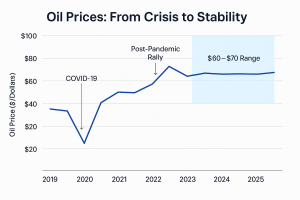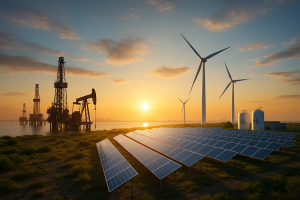Oil, Growth, and the Future of Energy: A Balancing Act
🛢️ Introduction
The last five years have been transformative for global oil markets. Post-COVID, oil prices rallied steadily before stabilizing in the aftermath of the Russia-Ukraine conflict in late 2022. Since then, crude has largely remained range-bound between $60–$70 per barrel, providing stability in otherwise volatile times.
Despite the rising chorus for renewable energy, our world remains deeply reliant on fossil fuels. This dependence will not vanish overnight—it is likely to persist for the next two to three decades. Oil, as both an economic driver and a job creator, remains tied to poverty alleviation and global growth.
“Energy is the lifeblood of modern economies.” – International Energy Agency (IEA)

📈 Different Priorities at Different Stages of Growth
As societies evolve, so do their priorities. For a hungry nation, food security comes first. Once achieved, focus shifts toward education, healthcare, wealth creation, and eventually sustainability.
This developmental ladder means not all nations can move at the same pace toward green energy. While some prioritize climate action, others must first secure economic growth. This divergence fuels the divide between the “haves” and “have-nots.”
🛢️ OPEC’s Dilemma: Pump More, or Save for Later?
For oil-exporting nations—particularly OPEC members—fossil fuels are lifelines. With uncertainty about the future of oil, they face a paradox: extract and sell more now before demand declines, or conserve reserves to retain future leverage. Most choose the former, as seen with U.S. rollbacks of climate regulations highlighting energy’s role as a tool of dominance.
⚖️ The Middle Path: Transition Without Disruption
The challenge is a balanced transition—sustaining growth while reducing carbon impact. A roadmap could be:
- Phase out coal by 2030.
- Reduce oil use by 2040, replaced largely by natural gas.
- Scale up carbon capture technologies.
- Ban single-use plastics and promote energy efficiency.
🚀 The Road Ahead: Testing Human Ingenuity
The next three decades will be a transition period unlike any in history. The energy mix of the future will test science, policy, and human creativity. Sustainable solutions may emerge that redefine how we think about energy altogether.
“The stone age didn’t end because we ran out of stones—it ended because humanity found better solutions.” – Sheikh Zaki Yamani

✅ Conclusion
Oil remains a cornerstone of economic activity, but the journey toward a cleaner, more sustainable energy system is already underway. The question is not whether we will transition, but how fast and intelligently we can manage it.